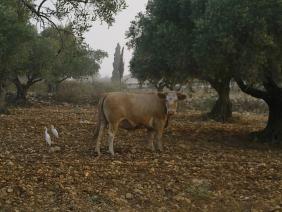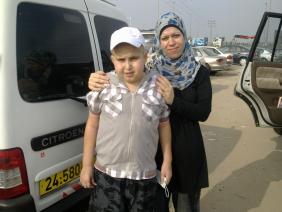'Anin, Reihan, Shaked, Thu 23.6.11, Morning
Translator: Charles K.
06:00 A’anin checkpoint
On our way to the checkpoint we caught red-handed the cows from Ein Sahala grazing on the olive trees in a grove belonging to a resident of A’anin. He often complains about the damage they do and says he knows who the cowherds are but isn’t able to do anything about them because of the fence.
The checkpoint is wrapped in fog that hides the sunrise.
About 30 people and a donkey, and also some tractors, wait in the center of the checkpoint, which has three gates : One to the grove on the village side (which we can’t see from where we’re standing), one in the center of the checkpoint and one at the entrance to the checkpoint from the seam zone. Closed off hermetically.
: One to the grove on the village side (which we can’t see from where we’re standing), one in the center of the checkpoint and one at the entrance to the checkpoint from the seam zone. Closed off hermetically.
There are children at the checkpoint because of school vacation, but not all go through. Even if it’s only to visit grandparents in Umm Reihan (the adjoining village in the seam zone, beyond the fence) or simply to help their father in the fields. Each child must come with the parent in whose ID card he’s listed, and with a birth certificate. Not all go through. The adults aren’t able to tell us why, the soldiers don’t want to tell us why (“Shut up, and please leave the checkpoint,” said a soldier to Netta). One of the children who was refused keeps insisting, isn’t willing to accept the edict and makes a fuss. The soldiers tell him, “Yallah, rukh” (beat it), the father, who’s already gone through the checkpoint, tells him, “Yallah, tra’wayyikh” (go home), and the boy is having a fit. He wants to cross, he wants to. The father, embarrassed, apologizes: “He’s not well mentally.” The boy keeps the soldiers busy until the checkpoint closes, he in Arabic, they in Hebrew. One of the Palestinians inside the checkpoint tries to push him back but the boy eludes him and returns to the soldiers. Before they close the checkpoint (after a delay, because of the “incident,” at 7 instead of 6:30), two soldiers push him forcefully through the middle gate and then to the lower one. The boy keeps yelling that he wants to cross. His father left a long time ago.
All the adults going through the checkpoint – women, elderly people, men – welcome us, stop for a friendly conversation, to complain, to joke (“I sat home 80 days waiting for a permit. What did I do? I was on the internet all day. Girls, of course. Why not? No good?). Under their influence, the younger generation also smiles at us on their own initiative. Sometimes.
07:05 Tura-Shaked checkpoint
Unlike the friendly atmosphere at A’anin, at Tura no one is in a hurry to talk to us in any language. Especially the women and youths. But one of the men who crossed from the West Bank to the seam zone is, in fact, willing to talk, in Hebrew. He told us that Abbas, the DCO, was replaced by Wael. The locals are willing to give him a chance. “We’ll see how it goes.” Opinions of Abbas are mixed. They’re not impressed by the state-in-waiting (Palestine) – what difference does it make? There’s no work in any case, and the money goes to the pockets of those on top.
There aren’t any pupils at the checkpoint, who usually liven things up. Crossing goes smoothly, with no problems. And why should there be problems? The only ones who come to the checkpoint are people with valid crossing permits. Many more would like to cross but have to remain home because they didn’t get permits.
07:35 Reihan checkpoint
The crossing goes like clockwork here, too, and there’s nothing to report, other than to note that here, too, there are very many people who want and must go through to Barta’a or to Jenin, were they able to obtain permits. We shouldn’t forget this, and must understand that the peace and quiet at the checkpoint is the result of the occupation’s purposely deceptive policies. A lie and a fraud, to say the least.
People exit quickly from the vehicles in which they arrived and are quickly swallowed up in the terminal. The workday begins here. Fancy new cars fill the parking lot,  some flying small Palestinian flags.
some flying small Palestinian flags.
We pick up Ali and his mother. Netta will bring them to the hospital. Ali speaks Hebrew that he learned at Rambam Hospital. A nice boy, full of medications. Fighting for his life. We hope the transplant will succeed and he’ll keep living.
